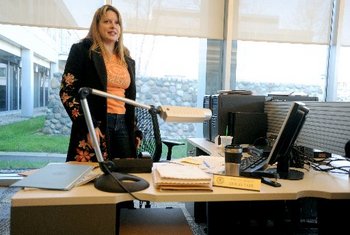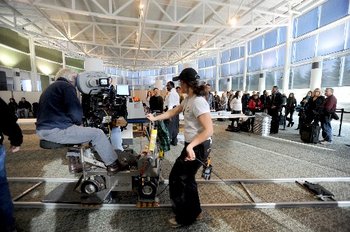"Trust" producers and screenwriter offer perspectives
Before David Schwimmer, director of the film “Trust” — which has been shooting in recent weeks in Ann Arbor, Plymouth, and Dexter — spoke to the press last week at the North Campus Research Complex (formerly Pfizer), two of the film’s producers, the screenwriter, and the director of the University of Michigan Film Office answered questions about the project.

"Trust" producer Heidi Jo Markel shows off the set of an FBI office built at the former Pfizer site.
Angela Cesere | AnnArbor.com
“It’s really a big two-hander of a father-daughter story, because the mother is more nurturing and accepting and supportive, whereas the father, I think, has to grapple with more guilt about the situation,” said Markel. “…And this is a really great vehicle for Clive Owen. … Just a meaty performance to sink his chops into, and bring a father’s protection of his children to something that’s on par with, tonally, ‘In the Bedroom,’ or something like that, where we see a parent dealing with feelings of revenge.”
Owen stars with Catherine Keener as the victim’s parents, and the film’s title plays on the different relationships that are threatened by this act of violence.
“Trust plays many roles in the story,” said producer Tom Hodges. “There’s the belief that you can trust that your kid will make the right decision; there’s the belief that you can trust that your parents will protect you; there’s the belief that the FBI will come and find the bad guy — there’s so many elements of how trust plays (out) in this script with each of these storylines, and how trust is broken and re-gained.”
Hodges also reinforced the idea that the story was a passion project for Schwimmer, who serves on the board of the Rape Foundation in Santa Monica.
“He just felt that this was a story that needed to be told,” Hodges explained, “about a girl who is smart, well-loved, and reasonably popular, and yet, she makes bad choices, and how parents need to still be checking on their kids, even when they think that their kid’s going to make a good decision.”
The crew appears to be on schedule with their six-week shoot, which began at the start of November.
“I met David 9 or 10 weeks ago,” said Markel. “This came together so fast. We met with the bond company, and the head of the bond company said, ‘How in the heck do you propose to do this movie, with this ambitious of a script, for this budget? I don’t understand.’ And (David) said, ‘Well, there’s this thing called the Pfizer (campus).”
Indeed, the “Trust” team’s timing couldn’t have been better regarding the use of the old Pfizer site. The University of Michigan, which purchased the property from Pfizer, isn’t scheduled to move anyone or anything in until January, making the site a gigantic blank slate of a production studio.

An airport set built at the former Pfizer site, now owned by the University of Michigan.
Angela Cesere | AnnArbor.com
Centralizing all these different locations in one space has saved the production team tons of time and money — to such a degree that the crew started joking about making a completely different movie in their off-hours. “By day ‘Trust,’ by night, horror film,” said Markel. “It seems like we’re working 24 hours a day anyway, so what’s the difference?”
The crew has also filmed at Dexter High School; U-M’s central campus (the family’s son starts his freshman year at U-M in the film) and law school (where the son apparently has the best first on-campus meal of all time); as well as in Plymouth and Novi’s Twelve Oaks Mall.
“We were so scared,” said Markel. “We were in this mall, where a girl is meeting a predator, and we were like, ‘Who is going to help us out with this?’ And then there’s the Body Shop that says, ‘Our mission is to stop human trafficking of children, so we couldn’t be more with you.’ … But it’s just amazing to me in this day and age, … how many people are closed off to it. How are you ever going to get the word out that this is something we want to prevent if you don’t show it?”
Screenwriter Andy Bellin, meanwhile, discussed how he became involved with the project.
“David approached me about two years ago with the idea for this movie, which is a really difficult topic because, … you go one direction and you end up with a movie like ‘Taken’ or ‘Ransom’ — which are great movies, just not what we wanted — and if you go this other way, you end up with an after-school special that doesn’t really entertain,” said Bellin. “We tried for a long time, when we were writing it, to really hit a middle ground that somehow crossed this emotional Rubicon and got to a point that was provocative and entertaining but wasn’t preachy. … It took us forever to get the script right.”
Finally, U-M Film Office director Lee Doyle — who makes sure that either she or a co-worker is on the set each day that filming occurs on campus — emphasized the fact that seven films have been partly shot on U-M's campus since the state's film incentive legislation passed, and that many U-M students have gained valuable work experience as a result. The Ann Arbor area has been a favorite stop for filmmakers.
“The reason we got into this business was primarily for the student opportunities,” said Doyle. “Students get hired as production assistants, … as location assistants, and this supplements their class work. … The other reason we do this is to support the economic development that the film industry brings to the state of Michigan. It’s bringing jobs here that are so sorely needed and … just brings a level of excitement to the state in a time when the state so badly needs it.”
Jenn McKee is the entertainment digital journalist for AnnArbor.com. Reach her at jennmckee@annarbor.com or 734-623-2546, and follow her on Twitter @jennmckee.


Comments
wacc
Wed, Dec 9, 2009 : 1:04 p.m.
We at Washtenaw Area Council for Children, a non-profit child abuse prevention agency, have been offering Internet Safety programming for both teens/pre-teens and adults for the past several years. We are one of only 5 communities in the nation to receive a federal grant to provide this program FREE of charge to ALL the school districts in Washtenaw, and to parents and community members. We cover such topics as the one this movie is based on, as well as Cyberbullying, Sexting, among other issues. To find more about what we offer and to arrange for a presentation at your school or community group, please send a message to internetsafety@washtenawchildren.org
Lehigh
Wed, Dec 9, 2009 : 9:44 a.m.
If Hollywood needs vacant properties for cost-effective filmmaking, Michigan is the place!
Kristin Judge
Wed, Dec 9, 2009 : 8:37 a.m.
The timing of this movie is good for our discussion about Cyber Security in Washtenaw County. We have had children in our community who have left their homes with strangers they met online. Sheriff Clayton and I are working with community partners to create a Washtenaw Area Cyber Security Task Force to help educate our youth, parents and business owners about online safety. As the Sheriff said recently, "The predators are no longer at the school yard. They are speaking to your kids in your own home." Awareness and dialogue are the first steps in keeping kids safe. We hope to help residents learn the tools they need. If you are interested in getting more involved, send an email to judgek@ewashtenaw.org.